Colonial Impact on Pastoral Nomads and Caravan Traders in India
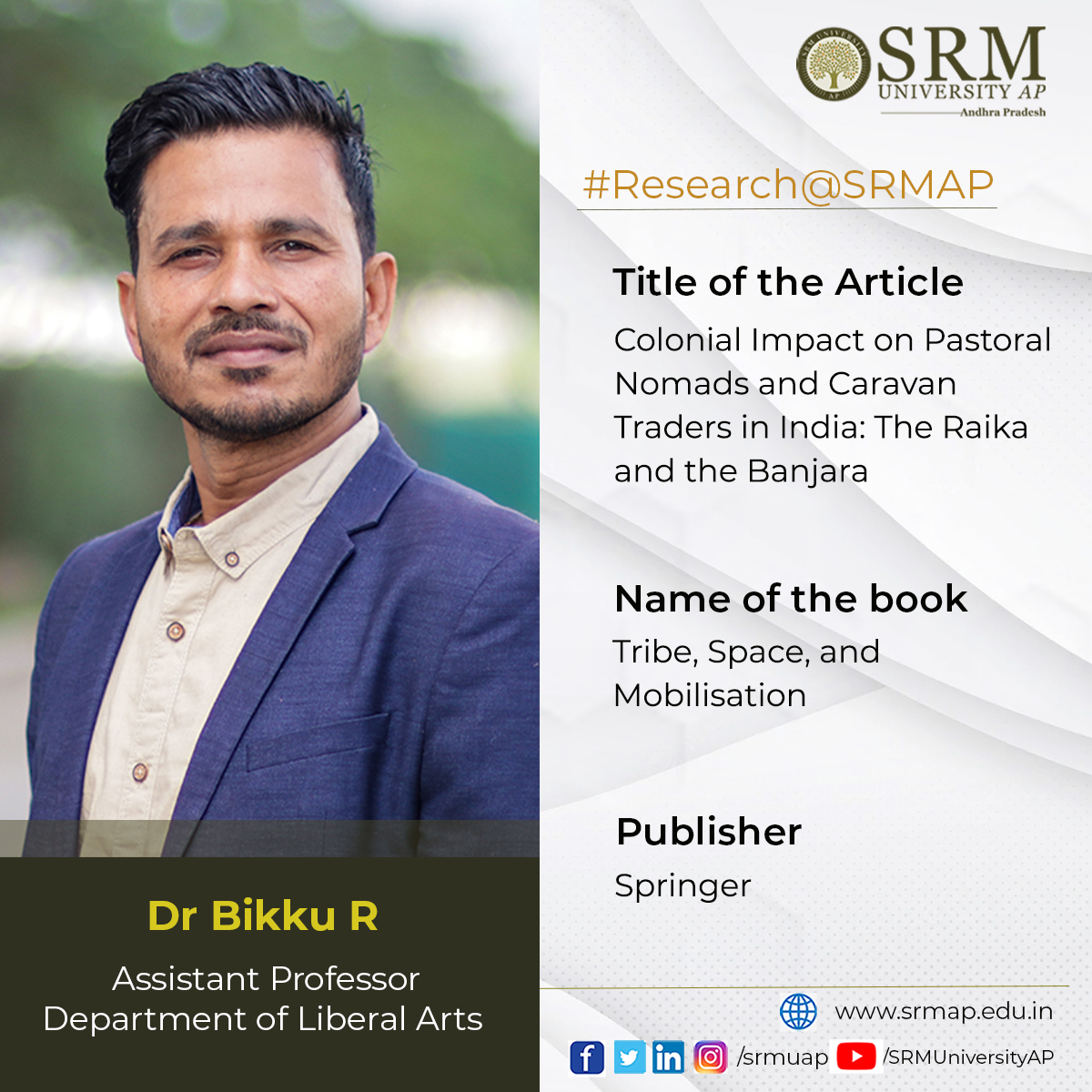 Cultural and Post-colonial studies enclose various historical approaches. It ranges from cultural studies and comparative social history to analysis of the means of domination and resistance. Nevertheless, there are communities that didn’t get the space they deserve in the studies of settled communities. Assistant Professor Dr Bikku R from the Department of Liberal Arts published a paper titled Colonial Impact on Pastoral Nomads and Caravan Traders in India: The Raika and the Banjara to analyse the aftereffects of colonialism in the most unexplored communities. The article was published in the book Tribe, Space, and Mobilisation.
Cultural and Post-colonial studies enclose various historical approaches. It ranges from cultural studies and comparative social history to analysis of the means of domination and resistance. Nevertheless, there are communities that didn’t get the space they deserve in the studies of settled communities. Assistant Professor Dr Bikku R from the Department of Liberal Arts published a paper titled Colonial Impact on Pastoral Nomads and Caravan Traders in India: The Raika and the Banjara to analyse the aftereffects of colonialism in the most unexplored communities. The article was published in the book Tribe, Space, and Mobilisation.
Abstract
The Raika of Rajasthan and the Banjara or Lambadi tribe of the Deccan region had been self-sustained as nomadic pastoralists and caravan traders, respectively, in pre-British India. Colonial policies imposed several restrictions on nomadic communities and their economic activities by branding them as ‘criminals’ under the Criminal Tribes Act of 1871. As a result, many of the nomadic communities lost their cultural economy and struggled to survive. Colonial and post-colonial studies have primarily focused on settled communities. However, little attention is paid to pastoral nomads and itinerary communities. The present paper focuses on the transformation of traditional nomadic livelihoods, culture, and economy of the two communities; the Raika pastoralist and the Banjara traditional caravan traders and livestock breeders’ as a consequence of colonial policies. It also emphasises current livelihood strategies. Empirical data resulting from ethnographic fieldwork and colonial and post-colonial literature have been examined. An ethnographic study among the Banjaras from the Deccan region during the year 2009- 2010 and the Raika of Rajasthan between 2013- 2015 and 2019 helped to understand their past and present situations. Colonial and post-colonial policies, governance, and their impact on pastoralists and other nomadic communities have been critically examined.
- Published in Departmental News, Liberal Arts News, News, Research News
Dr Ipsita Pradhan selected for a seminar on Urban Ethnography and Theory in Italy
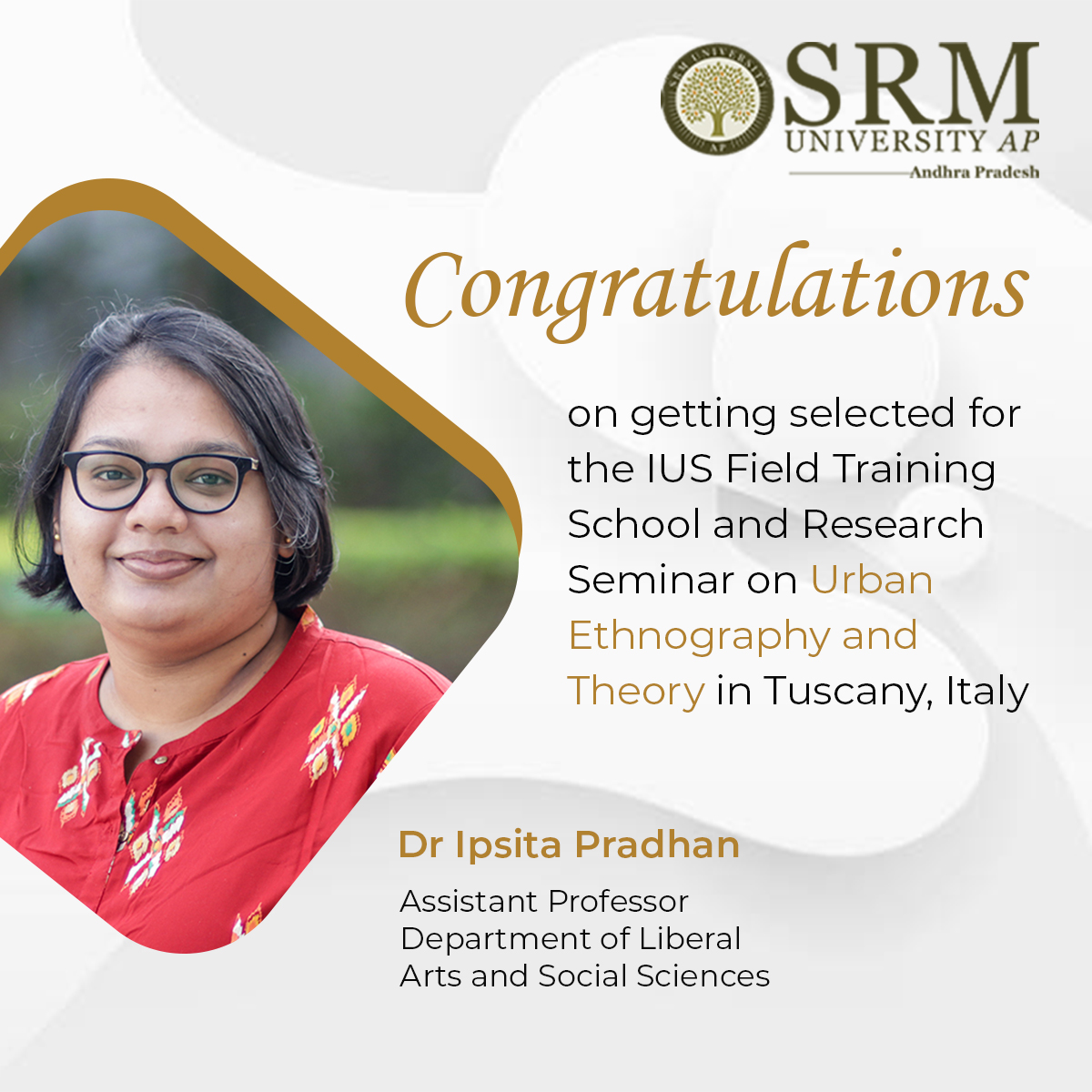 Recently, Assistant Professor Dr Ipsita Pradhan from the Department of Liberal Arts has been selected for the IUS Field Training School and Research Seminar on Urban Ethnography and Theory in Tuscany, Italy. The seminar was held from July 18 to 26, 2022.
Recently, Assistant Professor Dr Ipsita Pradhan from the Department of Liberal Arts has been selected for the IUS Field Training School and Research Seminar on Urban Ethnography and Theory in Tuscany, Italy. The seminar was held from July 18 to 26, 2022.
This eight-day Field Training School and Research Seminar is addressed to researchers, who are interested in ethnographic research and empirically grounded analysis. It is organised and hosted by the International Urban Symposium-IUS in collaboration with an international group of senior scholars from European, Indian, Middle Eastern, and US Universities. The school offers an interactive learning environment and opportunities to discuss the rationale and practices of research methods and mainstream debates. Participants will have the opportunity to present their own research and receive feedback from leading scholars. The Teaching Seminars will focus on methodological and theoretical debates, benefiting from senior scholars’ wide range of ethnographic, methodological, and theoretical expertise.
- Published in Departmental News, Liberal Arts News, News
Gendered work and contemporary India
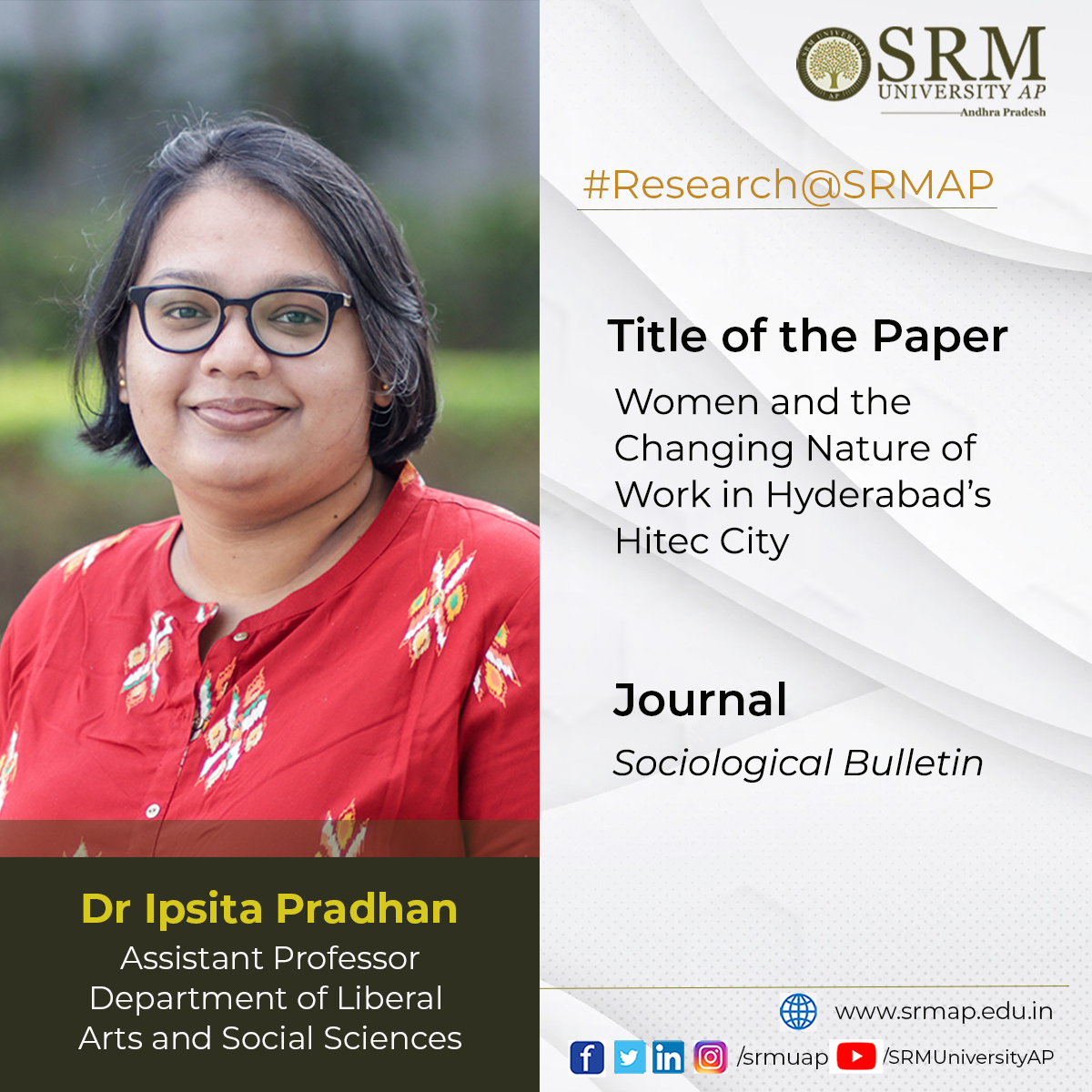 Economic institutions, technological developments, cultural norms, religious and intellectual currents, and popular beliefs have always played a huge role in asserting clear boundaries between men’s and women’s work. The recent research paper of Assistant Professor Dr Ipsita Pradhan, Department of Liberal Arts, focuses on the transformation of gendered work in contemporary India. The paper is titled Women and the Changing Nature of Work in Hyderabad’s Hitec City and was published in the journal Sociological Bulletin.
Economic institutions, technological developments, cultural norms, religious and intellectual currents, and popular beliefs have always played a huge role in asserting clear boundaries between men’s and women’s work. The recent research paper of Assistant Professor Dr Ipsita Pradhan, Department of Liberal Arts, focuses on the transformation of gendered work in contemporary India. The paper is titled Women and the Changing Nature of Work in Hyderabad’s Hitec City and was published in the journal Sociological Bulletin.
Abstract
This article looks at the ways in which gendered work is being transformed in contemporary India by focussing on Hyderabad, the capital of Telangana. Since the mid-1990s, after India opened its doors to multinational agencies, new forms of gendered labour have manifested. One of the ramifications of this gendered process is the feminisation of labour that enabled the participation of more women in the workforce, engaging in activities that were low-paid. The basis of feminisation is that certain jobs require fewer skills or particular kinds of skills, for which women are thought to be suitable. This also has implications for the low bargaining power of women workers. The feminisation of the labour force in HITEC city, Hyderabad is a consequence of the changing labour markets with globalisation, offshore factories, migration, and other changes in the workplace.
- Published in Departmental News, Liberal Arts News, News, Research News
The genealogy of post-truth and fake news in the Indian context
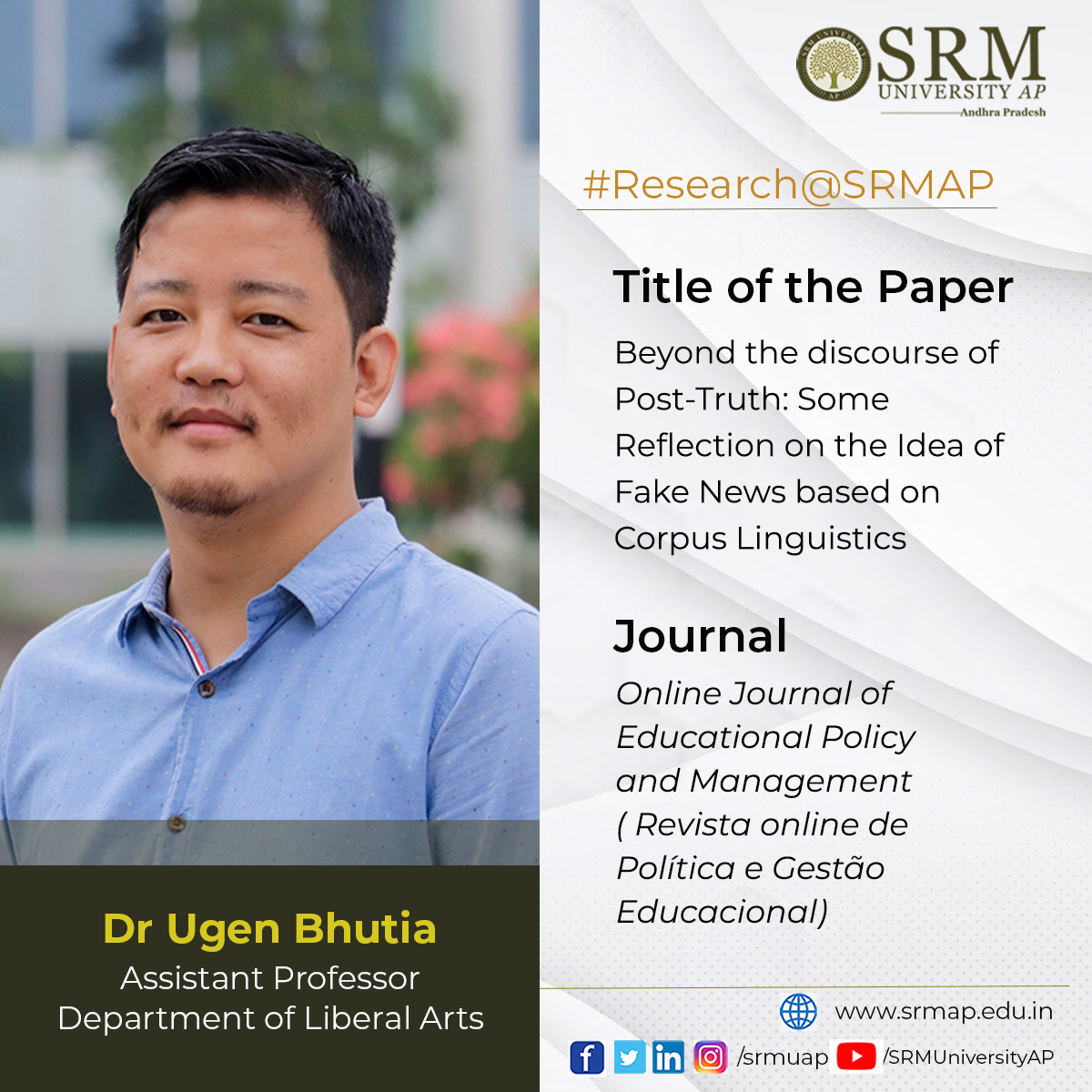 Post-truth represents the replacement of facts with personal beliefs and emotional appeals in order to shape public opinion. The distinction between fake and real news is not about reliable and unreliable sources. It’s about honesty and deception. The media can both inform and deceive people. What makes the news fake is the intention of its author. Discourses are produced by the effects of power within a social order. This power prescribes certain rules and categories that define the criteria for legitimating knowledge and truth within the discursive order. Assistant Professor Dr Ugen Bhutia of the Department of Liberal Arts published an article titled Beyond the discourse of Post-Truth: Some Reflection on the Idea of Fake News based on Corpus Linguistics in the Online Journal of Educational Policy and Management.
Post-truth represents the replacement of facts with personal beliefs and emotional appeals in order to shape public opinion. The distinction between fake and real news is not about reliable and unreliable sources. It’s about honesty and deception. The media can both inform and deceive people. What makes the news fake is the intention of its author. Discourses are produced by the effects of power within a social order. This power prescribes certain rules and categories that define the criteria for legitimating knowledge and truth within the discursive order. Assistant Professor Dr Ugen Bhutia of the Department of Liberal Arts published an article titled Beyond the discourse of Post-Truth: Some Reflection on the Idea of Fake News based on Corpus Linguistics in the Online Journal of Educational Policy and Management.
Abstract
The article illustrates how we deceive ourselves by attempting to understand fake news through the notion of a post-truth society. The paper argues that the concepts of fake news and post-truth are not an aberration in the history of media practices and neither of contemporary origins. They are an intricate part of the discursive practices in which media as an institution engages. The article builds on Foucault’s approach to discursive practices and applies a meta-discursive framework to trace the genealogy of post-truth and fake news in an Indian context. The article also critically reflects on some key strategies to contain and counter fake news. For instance, media literacy and linguistic approaches such as corpus linguistics to detect fake news.
- Published in Departmental News, Liberal Arts News, News, Research News
Aesthetic labour, Body, and Femininity
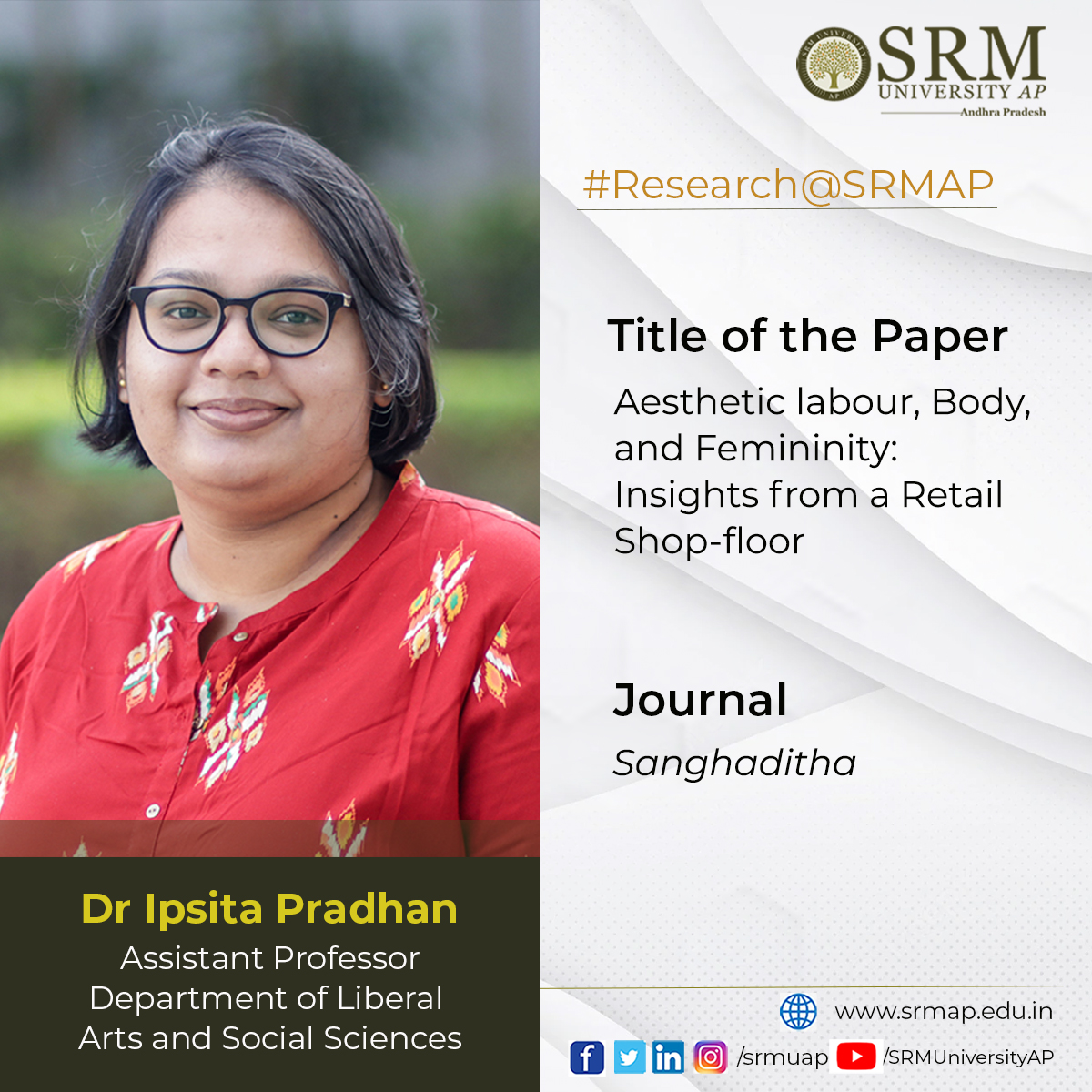 The value of certain looks or appearances is constructed intentionally, and it directly takes part in social stratification. The explanation for this practice can be found in the concept of aesthetic labour. Aesthetic labour implies the practice of screening, managing, and controlling workers on the basis of their physical appearance. When read together with femininity and body, the concept discloses several crucial dimensions. Assistant Professor Dr Ipsita Pradhan, Department of Liberal Arts, published an article titled Aesthetic labour, Body, and Femininity: Insights from a Retail Shop-floor in the journal Sanghaditha. The paper is translated from English to Malayalam by Dr Anu Kuriakose.
The value of certain looks or appearances is constructed intentionally, and it directly takes part in social stratification. The explanation for this practice can be found in the concept of aesthetic labour. Aesthetic labour implies the practice of screening, managing, and controlling workers on the basis of their physical appearance. When read together with femininity and body, the concept discloses several crucial dimensions. Assistant Professor Dr Ipsita Pradhan, Department of Liberal Arts, published an article titled Aesthetic labour, Body, and Femininity: Insights from a Retail Shop-floor in the journal Sanghaditha. The paper is translated from English to Malayalam by Dr Anu Kuriakose.
Abstract
The essay discusses the importance of the body in interactive service work. By focusing on women retail shop floor workers, employed in the apparel and cosmetic sections of multi-national brands argues that employment in this sector requires working on one’s body to produce a “presentable” body by grooming so as to fit the larger image that the mall presents. The presence of the mannequin and its dressing is also analysed to understand how it perpetuates stereotypes of the ‘ideal’ body through the apparent function of attracting customers or giving the customers an idea of the products on display, simultaneously perpetuating the male gaze on ‘acceptable’ feminine bodies.
- Published in Departmental News, Liberal Arts News, News, Research News
The prospects and challenges in India-ASEAN relations
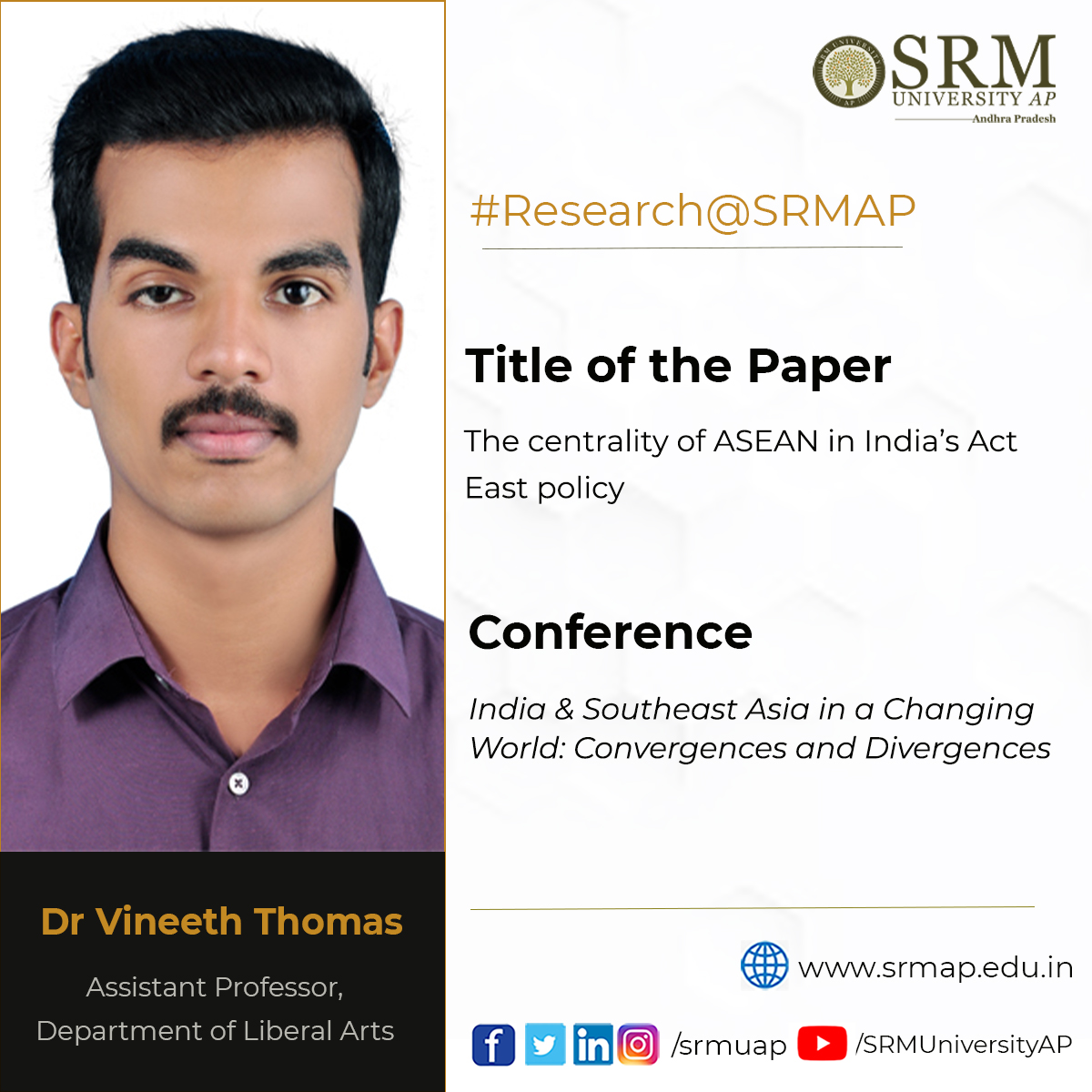 The upcoming international conference, India & Southeast Asia in a Changing World: Convergences and Divergences, will examine India’s Act East policy, investigating its prospects and challenges in the Southeast Asian region. Assistant Professor Dr Vineeth Thomas from the Department of Liberal Arts has been selected for presenting a paper at this Conference organised by Christ University, Delhi NCR. He will present the paper titled The centrality of ASEAN in India’s Act East policy at the conference.
The upcoming international conference, India & Southeast Asia in a Changing World: Convergences and Divergences, will examine India’s Act East policy, investigating its prospects and challenges in the Southeast Asian region. Assistant Professor Dr Vineeth Thomas from the Department of Liberal Arts has been selected for presenting a paper at this Conference organised by Christ University, Delhi NCR. He will present the paper titled The centrality of ASEAN in India’s Act East policy at the conference.
The international conference will be held In-Person from 14 to 15 October 2022 at the CHRIST (Deemed to be University) Delhi-NCR campus. The Hanns Seidel Foundation funds this conference. The major focus area of the conference is India’s foreign policy towards ASEAN countries like Myanmar, Thailand, Malaysia, Vietnam, Indonesia, and Singapore
Abstract
Against the backdrop of multi-dimensional developments and interventions in the Indo-Pacific region, India’s overseas policy and national security apprehensions have undergone substantial changes in the past few decades. Starting with the Look East Policy in the 1990s, India advanced its policy in 2014 as Act East Policy. The potential benefits of bilateral and multilateral relations in the Indo-pacific region made India take up its partnership with the Association of Southeast Asian Nations (ASEAN) seriously, which provided an opening and strip for India to explore Southeast Asia. This paper evaluates the significance of keeping ASEAN at the heart of India’s Act East Policy by illustrating the prospects and challenges in India-ASEAN relations.
- Published in Departmental News, Liberal Arts News, News, Research News
A Critical Analysis of Faith-based Healing
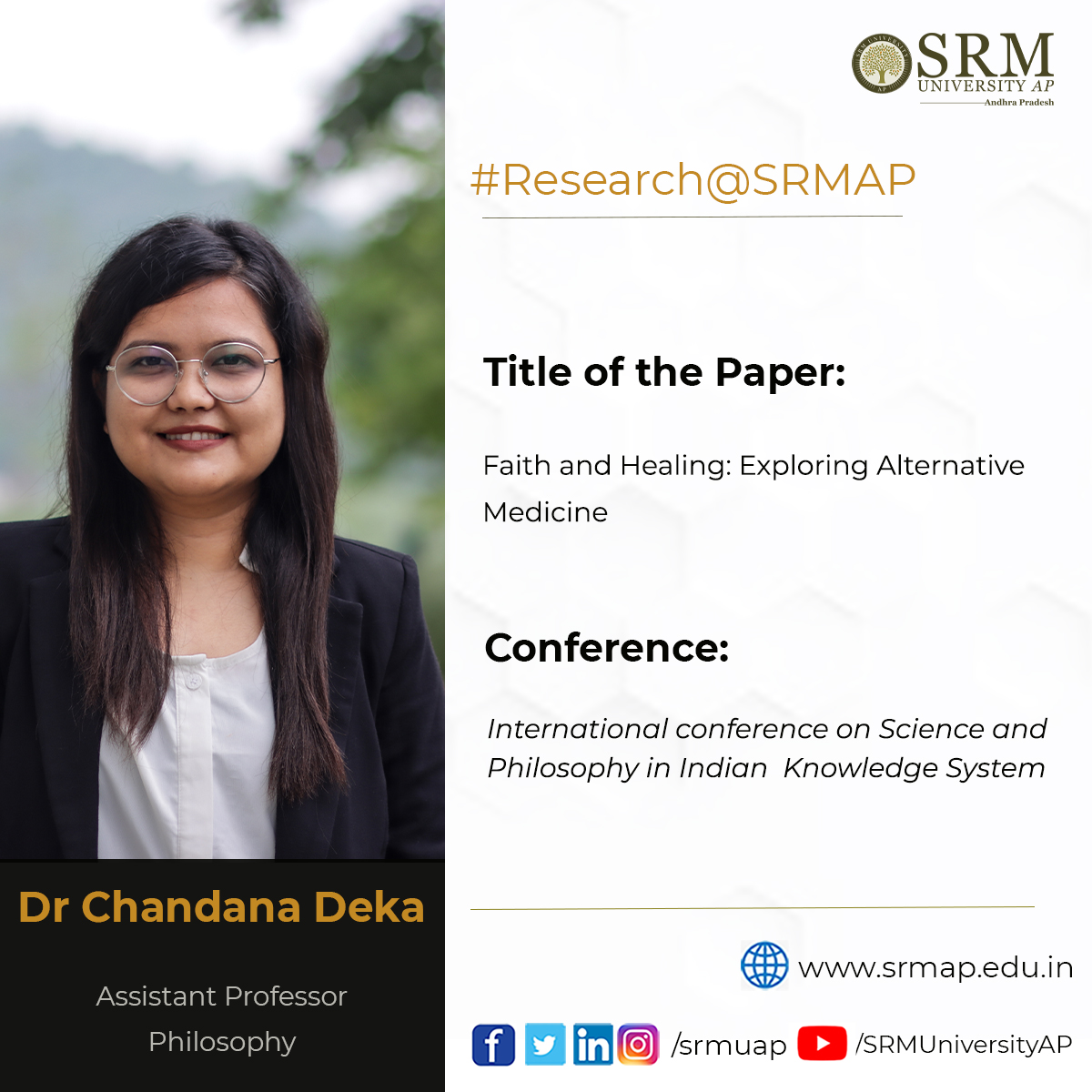 Dr Chandana Deka from the Department of Liberal Arts presented a paper titled Faith and Healing: Exploring Alternative Medicine at the international conference on Science and Philosophy in Indian Knowledge System organised by the Institute for Science and Spirituality Delhi in partnership with Noida International University IKS Division, Ministry of Education, Govt. of India from December 17 to 18, 2022. Her paper has also been published as part of conference proceedings.
Dr Chandana Deka from the Department of Liberal Arts presented a paper titled Faith and Healing: Exploring Alternative Medicine at the international conference on Science and Philosophy in Indian Knowledge System organised by the Institute for Science and Spirituality Delhi in partnership with Noida International University IKS Division, Ministry of Education, Govt. of India from December 17 to 18, 2022. Her paper has also been published as part of conference proceedings.
Abstract
Fideism is a school of thought that gives importance to faith as against reason in matters related to religion. Fideism is defined as “the view that religious belief systems are not subject to rational evaluation” (Peterson, 2003). But matters related to religion do not confine only to the transcendental aspects of religion, it also impacts and influences the socio-cultural and ethical aspects (Durkheim, 1912). In this paper, the researcher discusses one such socio-cultural aspect of religious faith, that is, religious healing. Faith-based healing is often considered one form of alternative medicine (Andrew Village, 2005). In this paper, she explores this faith-based healing and contends that not all forms of faith-based healing can be appropriated. She tries to give a theoretical justification as to which forms of faith-based healing can be adopted and which need not be. The research is analytical and critical in nature based on materials that include books and articles written on fideism and different religious Texts.
- Published in Departmental News, Liberal Arts News, News, Research News
Reservation for Communities in Sikkim: Examining the Political Demand
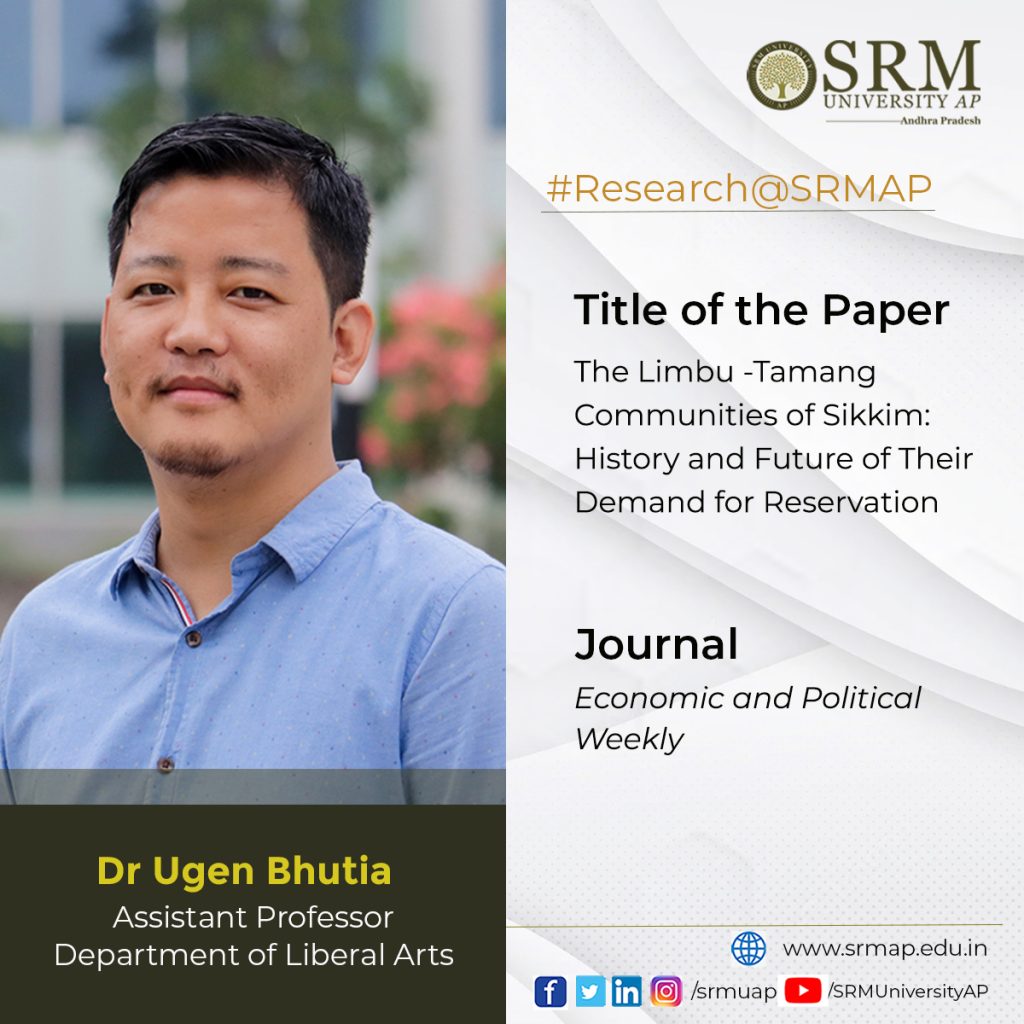 It is a prerequisite for a country like India showcasing vast cultural, social, political and economic diversity, for adopting an unprejudiced reservation system to ensure equal and just representation of varied communities in the political decision-making process of the country. But many communities that have been historically disadvantageous(SC/ST) still struggle to receive their right to representation. Dr Ugen Bhutia, Assistant Professor, Department of Liberal Arts, has published a paper titled “The Limbu–Tamang Communities of Sikkim History and Future of Their Demand for Reservation” in the Journal Economic and Political Weekly. The paper provides a comprehensive outlook on the complex history of the communities in Sikkim and past events that have cumulated in their demand for representation in the democratic polity of the country. The future direction of the demand for reservation and its prospective outcomes have also been emulated.
It is a prerequisite for a country like India showcasing vast cultural, social, political and economic diversity, for adopting an unprejudiced reservation system to ensure equal and just representation of varied communities in the political decision-making process of the country. But many communities that have been historically disadvantageous(SC/ST) still struggle to receive their right to representation. Dr Ugen Bhutia, Assistant Professor, Department of Liberal Arts, has published a paper titled “The Limbu–Tamang Communities of Sikkim History and Future of Their Demand for Reservation” in the Journal Economic and Political Weekly. The paper provides a comprehensive outlook on the complex history of the communities in Sikkim and past events that have cumulated in their demand for representation in the democratic polity of the country. The future direction of the demand for reservation and its prospective outcomes have also been emulated.
Abstract
Since its merger in 1975 with the Indian union, one of the major sociopolitical issues in Sikkim has been the demand for reservation in the state legislative assembly for two communities—Limbu and Tamang. The demand of reservation for the Limbus and Tamangs crystallised in Sikkim when these communities were notified as Scheduled Tribes under the Scheduled Castes and Scheduled Tribes Orders (Amendment) Act, 2002. The history and future of this political demand has been analysed.
- Published in Departmental News, Liberal Arts News, News, Research News
Book Review Published on the LSE Review of Books Website
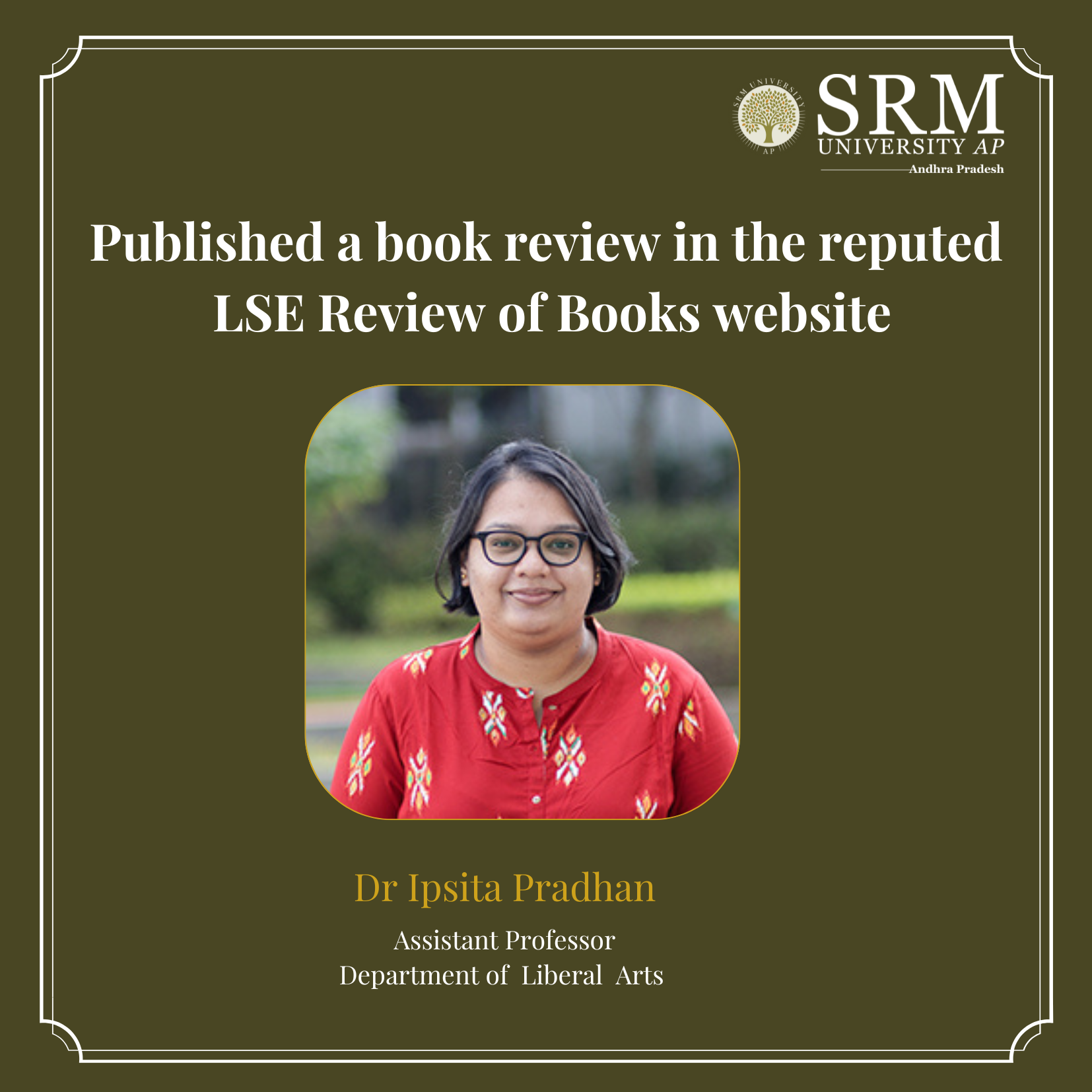 Assistant Professor Dr Ipsita Pradhan, Department of Liberal Arts, has recently published a book review on the renowned LSE Review of Books website. In her recent review, Dr Pradhan offers insightful perspectives on the book Confidence Culture by Shani Orgad and Rosalind Gill. This crucially important book appeals to media studies, American studies, and feminist scholars, as well as a wide public audience.
Assistant Professor Dr Ipsita Pradhan, Department of Liberal Arts, has recently published a book review on the renowned LSE Review of Books website. In her recent review, Dr Pradhan offers insightful perspectives on the book Confidence Culture by Shani Orgad and Rosalind Gill. This crucially important book appeals to media studies, American studies, and feminist scholars, as well as a wide public audience.
Dr Ipsita Pradhan elaborates on how the book assures that self-love affirmations in contemporary times are not free from the disciplinarian gaze of the market and its neoliberal capitalist mechanisms, as it is often measured through one’s productivity. She commends the authors’ rigorous research and compelling arguments, stating that the book offers a much-needed critique of the prevailing cultural narrative around confidence.
“In Confidence Culture, Shani Orgad and Rosalind Gill explore the demands that the cultural imperative of confidence particularly places on women. Enriched by abundant examples drawn from across popular culture to show how ‘confidence culture’ puts the onus on individuals to navigate and solve systemic problems, this book is necessary reading for scholars of gender, media studies and sociology”, writes Dr Ipsita Pradhan.
LSE Review of Books publishes daily reviews of academic books across the social sciences. It aims to facilitate the sharing and exchange of knowledge between experts within and outside the academy and to open up academic research to increase its impact. LSE Review of Books is a forum to encourage engagement with the latest academic publications across the social sciences and the humanities.
- Published in Departmental News, Faculty Achievements, Liberal Arts News, News
Social Support and the Resilience Among Young Adults in Kashmir
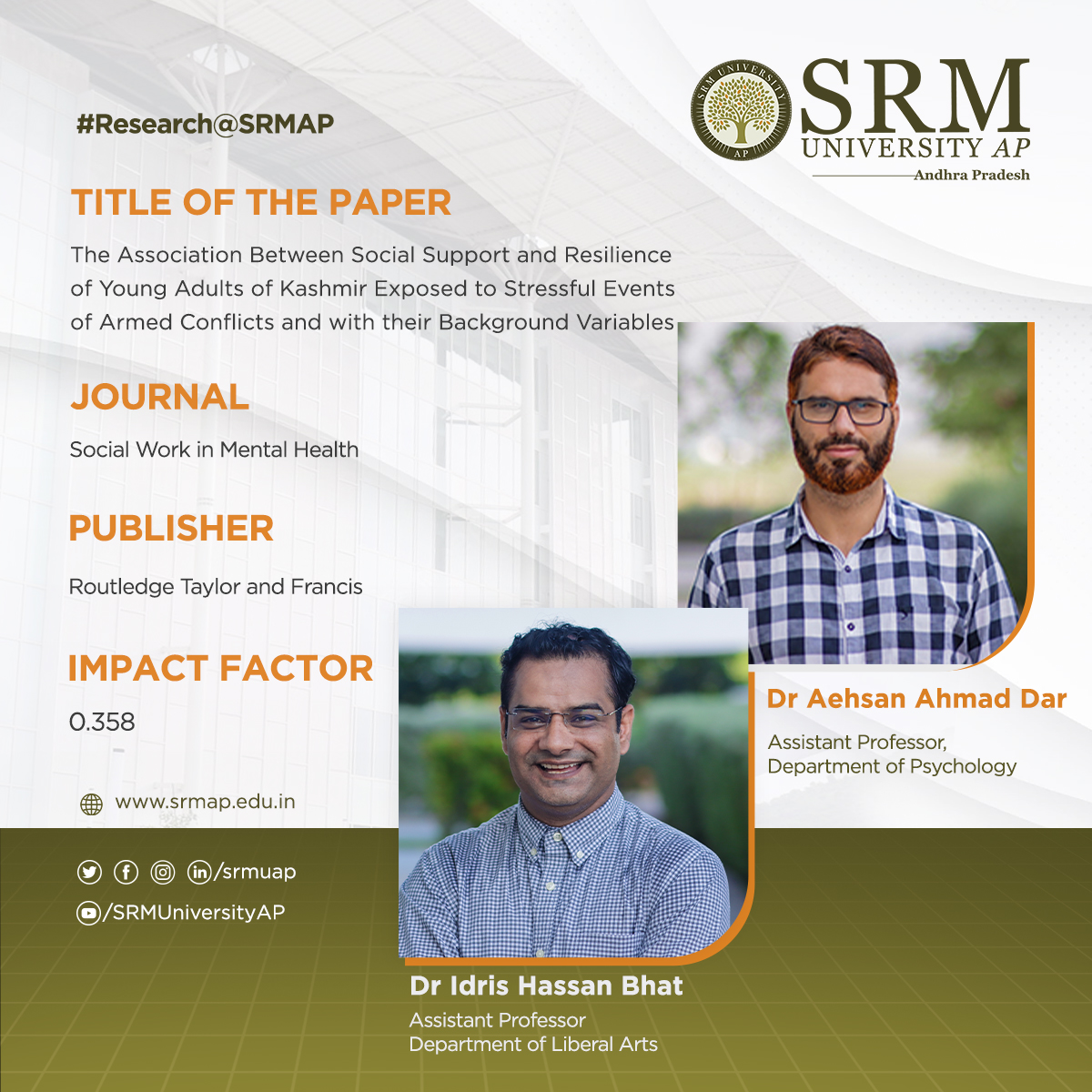 The latest research paper of Dr Aehsan Ahmad Dar, Assistant Professor, Department of Psychology, and Dr Idris Hassan Bhat, Assistant Professor, Department of Liberal Arts, examines the relationship between social support and resilience among young adults in Kashmir who have been exposed to the traumatic events of armed conflicts. His paper titled The Association Between Social Support and Resilience of Young Adults of Kashmir Exposed to Stressful Events of Armed Conflicts and with Their Background Variables was published in the esteemed journal Social Work in Mental Health, which is issued by the reputed publisher Routledge Taylor and Francis.
The latest research paper of Dr Aehsan Ahmad Dar, Assistant Professor, Department of Psychology, and Dr Idris Hassan Bhat, Assistant Professor, Department of Liberal Arts, examines the relationship between social support and resilience among young adults in Kashmir who have been exposed to the traumatic events of armed conflicts. His paper titled The Association Between Social Support and Resilience of Young Adults of Kashmir Exposed to Stressful Events of Armed Conflicts and with Their Background Variables was published in the esteemed journal Social Work in Mental Health, which is issued by the reputed publisher Routledge Taylor and Francis.
Through the research, they found that social support plays a crucial role in enhancing the resilience of young adults and reducing the adverse effects of traumatic experiences. This publication is a significant contribution to the field of social work and mental health, particularly in the context of the ongoing conflict in Kashmir. The findings of the researchers highlight the importance of social support in promoting the mental health and well-being of individuals who have experienced trauma.
Abstract
The current study examined the association of social support and background variables with resilience among young adults exposed to traumatic and stressful events of armed conflict in Kashmir, India. Data were collected from 693 participants using a multi-stage sampling method. Findings revealed that social support and gender were positively associated with resilience, whereas education, income, and maternal education were negatively associated with resilience. Moreover, feeling insecure and psychologically distressed as a result of the conflict was negatively associated with resilience, whereas the perception that the Kashmir conflict would be resolved was positively associated with resilience. The findings suggest fostering resilience in this population.
- Published in Departmental News, Liberal Arts News, News, Psychology News, Research News

